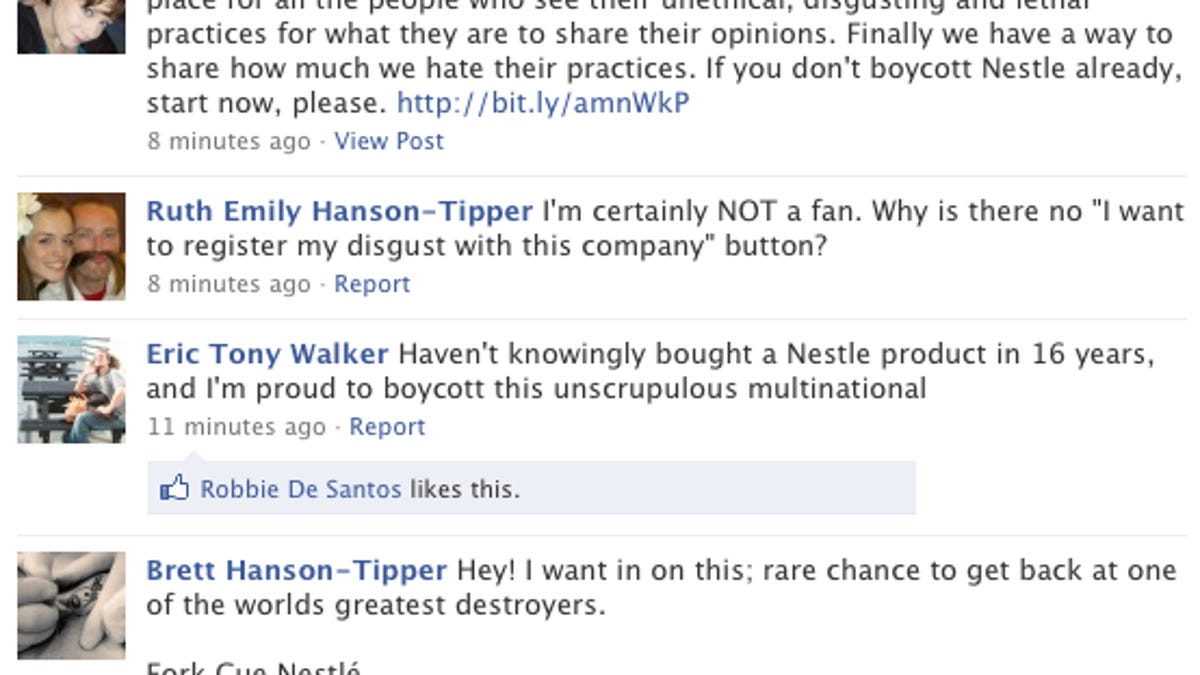Nestle mess shows sticky side of Facebook pages
Food company's Facebook fan page became a lesson in how not to deal with social-media backlash this week, when a company rep snapped back at environmentally motivated critics.

Uh-oh. We've got another social-media-meets-public-relations disaster on our hands, and this one doesn't even involve any airlines yet. Food giant Nestle, already under pressure from environmentalists, became the subject of a Facebook- and Twitter-based "twitstorm" when the operators of the corporation's Facebook page took a hostile approach to critics.
So here's how it appears to have started: Environmental activist group Greenpeace has long been putting the pressure on Nestle to stop using palm oil, the production of which has been documented as a source of deforestation, greenhouse gas emissions, and endangered species loss. A provocative new Web video campaign (warning: may be a bit nauseating) on behalf of Greenpeace's U.K. arm targeted the food manufacturer as a threat to the livelihoods of orangutans, and according to Greenpeace, Nestle lobbied to have the video removed from YouTube, citing a copyright complaint. Cue plenty of free press for Greenpeace.
But it got worse. These days, just about every brand has a public forum in the form of a Facebook fan page, and Greenpeace supporters--whom the activist group had encouraged to change their Facebook profile photos to anti-Nestle slogans that often incorporated one or more of the company's food logos--started posting to the Nestle fan page en masse. Nestle countered with a mild threat: "To repeat: we welcome your comments, but please don't post using an altered version of any of our logos as your profile pic--they will be deleted." A Nestle rep diving into the comments of the thread with responses like "Oh please...it's like we're censoring everything to allow only positive comments" didn't calm things down.
Now, to be fair, Nestle has the right to protect its intellectual property (though several intellectual-property attorneys with whom CNET spoke said that the logo-alteration issue would have a relatively shaky foothold if it ever went to court), but that's not what the Web sees; rather, these come across as two instances where it's been attempting to stifle criticism by citing copyright and trademark. And the remarks on behalf of the page administrator were what really pushed it over the edge.
Reactions on the page ranged from "Hey PR moron. Thanks you are doing a far better job than we could ever achieve in destroying your brand," to "It's not OK for people to use altered versions of your logos, but it's OK for you to alter the face of Indonesian rainforests? Wow!" to a gentler "I like some Nestle products so I qualify as a 'fan.' I would like Nestle to make them even better by removing palm oil. I would like to enjoy my Kit-Kats without feeling responsible for rainforest destruction and orangutan deaths." Comments from a decent handful of Nestle supporters were drowned out.
Finally, under fire, the Nestle rep apologized for snapping back at fans. "This (deleting logos) was one in a series of mistakes for which I would like to apologize. And for being rude. We've stopped deleting posts, and I have stopped being rude."
Putting aside all judgment on who's right and who's wrong in this situation, we are seeing the dark side of the Facebook fan page: when what was intended to be an open way for fans to show their support was turned into a billboard of outrage on behalf of critics, and with a company representative in obvious panic over how to tame the mob. It's rare that public opposition will reach a truly uncontrollable level, but when it does, it's ugly. A few years ago, Digg began pulling user-posted links to a DVD crack code in response to a Digital Millennium Copyright Act (DMCA) takedown notice, but the negative response from Digg's notoriously anti-censorship user base proved so vocal that the company said it would leave the links up and deal with the legal consequences. Backlash over Facebook's Beacon advertising program ultimately doomed it.
But this is the first time that we've seen such a massive blow-up in the comments of a Facebook fan page. Right now, the Facebook page is one of the hottest digital marketing tools out there, and brands hearing about the Nestle debacle are also seeing the downsides of operating such a public forum to welcome consumer comments. Whether this will be remembered as a single badly mismanaged user backlash or a pratfall of social-media marketing in general has yet to be seen.

